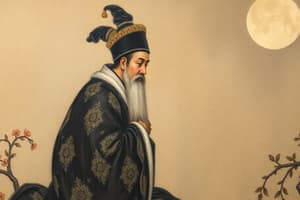Podcast
Questions and Answers
What is the Golden Rule in Confucianism and why is it significant?
What is the Golden Rule in Confucianism and why is it significant?
The Golden Rule is 'Do not do unto others what you would not want others to do unto you.' It is significant as it emphasizes the importance of empathy and moral behavior in interpersonal relationships.
Who was Confucius and what was his contribution to Chinese philosophy?
Who was Confucius and what was his contribution to Chinese philosophy?
Confucius was a philosopher and teacher who lived from 551-479 B.C.E. His thoughts on ethics and morality were recorded by his disciples and became foundational to Confucianism.
Define 'filial piety' in the context of Confucianism and explain its importance.
Define 'filial piety' in the context of Confucianism and explain its importance.
Filial piety is the respect and devotion that one is expected to show towards their parents. It is considered the most important value in Confucianism as it is believed to ensure harmony in family and society.
What are the five key relationships in Confucianism and their significance?
What are the five key relationships in Confucianism and their significance?
What is the main focus of Taoism compared to Confucianism?
What is the main focus of Taoism compared to Confucianism?
Flashcards
Confucianism
Confucianism
An ancient Chinese belief system focusing on personal ethics, morality, and ancestor worship.
Confucius
Confucius
The founder of Confucianism; a philosopher and teacher (551-479 BCE).
Filial piety
Filial piety
Respect for parents; a core Confucian value.
Li (ritual propriety)
Li (ritual propriety)
Signup and view all the flashcards
Jen (benevolence)
Jen (benevolence)
Signup and view all the flashcards
Study Notes
Confucianism
- Ancient Chinese belief system emphasizing personal ethics and morality.
- Focuses on ancestor worship and human-centered virtues for peaceful living.
- Golden Rule: "Do not do unto others what you would not want others to do unto you."
- Also known as "the school of the scholars."
- Founded by Confucius (551-479 BCE), a philosopher and teacher.
- Confucius's teachings on ethics, behavior, and morality were documented by disciples.
- Was an itinerant teacher.
- Social Harmony: Specific social roles (father/son, brother/brother, husband/wife, ruler/subjects, friend/friend) were crucial for harmony within society.
- Filial Piety: Respect for parents is paramount; respect for parents leads to a well-ordered life.
- Key Confucian virtues:
- Li: Ritual, propriety, etiquette
- Hsiao: Love within family, parent-child love
- Yi: Righteousness
- Xin: Honesty, trustworthiness
- Jen: Benevolence, humaneness towards others (highest virtue)
- Chung: Loyalty to the state
Taoism (Daoism)
- Also known as Daoism, a Chinese religion and philosophical teaching.
- Focuses on "Tao," meaning "way" or the way of the universe.
- Founded by Lao Zi (566-470 BCE), considered a great sage of China.
- Lao Zi's teachings contrasted with Confucius's:
- Confucius focused on mundane world, social behavior, and earthly matters.
- Lao Zi focused on the metaphysical world, spirit, and living in harmony with nature.
- Taoism seeks a harmonious balance between a person and nature.
- Origins debated; Lao Zi's existence may be a myth. Lao Zi is known as "Old Master".
- Lao Zi is from the Hunan province and served in the Imperial Archives. He supposedly retired and wrote the Tao Te Ching.
- Evolution after Lao Zi: Taoist tradition evolved into rituals involving deities and spirits.
Tao Te Ching (Dao De Jing)
- Attributed to Lao Zi, a foundational text of Taoism.
- Composed of 81 poems containing 5,250 Chinese characters.
- Highly translated, second only to the Bible.
- Central concept: Dao (Truth, Absolute, Nature, Way of Nature & the Way):
- Dao is the ultimate reality, source of order & sustains all.
- Dao is the Way of Nature and the Way to the Absolute.
- The path to understanding Dao is elusive; striving to know it actually distracts from it.
- Wu Wei: Non-action or non-purposiveness; letting nature take its course.
Studying That Suits You
Use AI to generate personalized quizzes and flashcards to suit your learning preferences.


